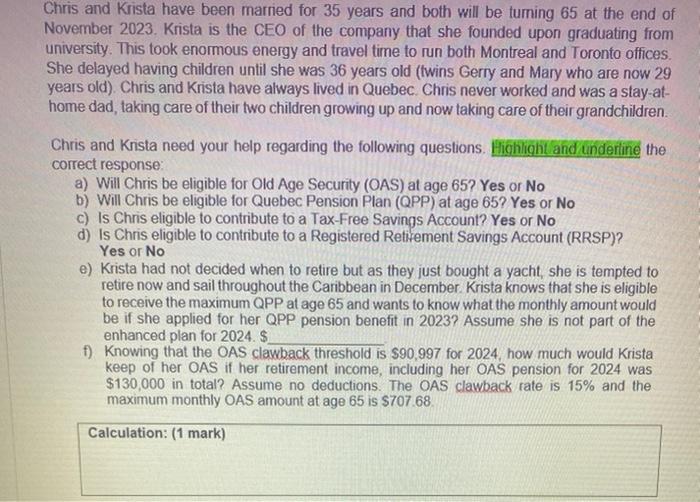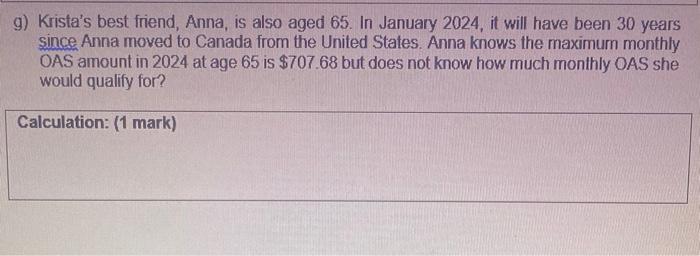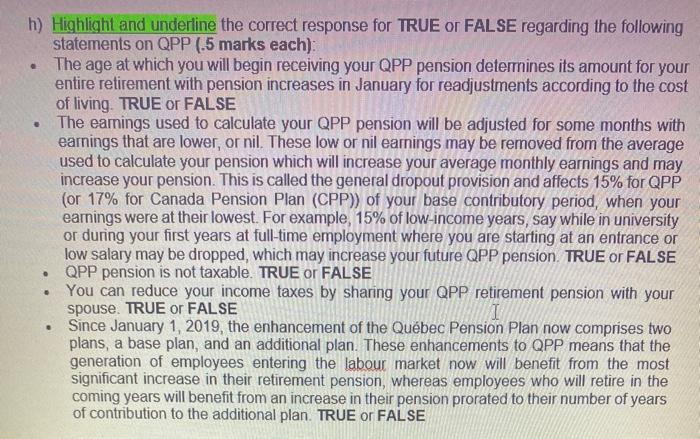Chris and Krista have been married for 35 years and both will be tuming 65 at the end of November 2023. Krista is the CEO of the company that she founded upon graduating from university. This took enormous energy and travel time to run both Montreal and Toronto offices. She delayed having children until she was 36 years old (twins Gerry and Mary who are now 29 years old). Chris and Krista have always lived in Quebec. Chris never worked and was a stay-athome dad, taking care of their two children growing up and now laking care of their grandchildren. Chris and Krista need your help regarding the following questions. Highlight and underline the correct response: a) Will Chris be eligible for Old Age Security (OAS) at age 65 ? Yes or No b) Will Chris be eligible for Quebec Pension Plan (QPP) at age 65? Yes or No c) Is Chris eligible to contribute to a Tax-Free Savings Account? Yes or No d) Is Chris eligible to contribute to a Registered Retirement Savings Account (RRSP)? Yes or No e) Krista had not decided when to retire but as they just bought a yacht, she is tempted to retire now and sail throughout the Caribbean in December. Krista knows that she is eligible to receive the maximum QPP at age 65 and wants to know what the monthly amount would be if she applied for her QPP pension benefit in 2023? Assume she is not part of the enhanced plan for 2024.$ f) Knowing that the OAS clawback threshold is $90,997 for 2024 , how much would Krista keep of her OAS if her retirement income, including her OAS pension for 2024 was $130,000 in total? Assume no deductions. The OAS clawback rate is 15% and the maximum monthly OAS amount at age 65 is $707.68. g) Krista's best friend, Anna, is also aged 65 . In January 2024, it will have been 30 years since Anna moved to Canada from the United States. Anna knows the maximum monthly OAS amount in 2024 at age 65 is $707.68 but does not know how much monthly OAS she would qualify for? h) Highlight and underline the correct response for TRUE or FALSE regarding the following statements on QPP (.5 marks each): - The age at which you will begin receiving your QPP pension determines its amount for your entire retirement with pension increases in January for readjustments according to the cost of living. TRUE or FALSE - The earnings used to calculate your QPP pension will be adjusted for some months with earnings that are lower, or nil. These low or nil earnings may be removed from the average used to calculate your pension which will increase your average monthly earnings and may increase your pension. This is called the general dropout provision and affects 15% for QPP (or 17% for Canada Pension Plan (CPP)) of your base contributory period, when your earnings were at their lowest. For example, 15% of low-income years, say while in university or during your first years at full-time employment where you are starting at an entrance or low salary may be dropped, which may increase your future QPP pension. TRUE or FALSE - QPP pension is not taxable. TRUE or FALSE - You can reduce your income taxes by sharing your QPP retirement pension with your spouse. TRUE or FALSE - Since January 1, 2019, the enhancement of the Qubec Pension Plan now comprises two plans, a base plan, and an additional plan. These enhancements to QPP means that the generation of employees entering the labour market now will benefit from the most significant increase in their retirement pension, whereas employees who will retire in the coming years will benefit from an increase in their pension prorated to their number of years of contribution to the additional plan. TRUE or FALSE









